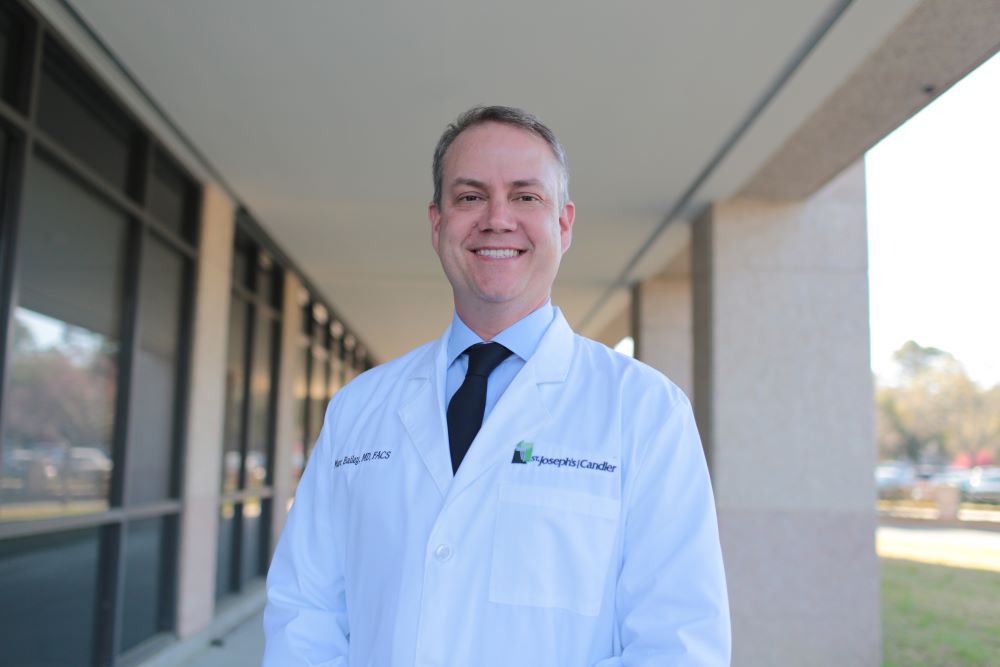
Cancer
Where can I get treated for esophageal cancer?
St. Joseph’s/Candler cardiothoracic surgeon Dr. Marc Bailey explains why you want to choose the Lewis Cancer & Research Pavilion if you are diagnosed with this type of cancer and stay close to home
Esophageal cancer is not a very common cancer. In fact, it only makes up about one percent of all cancers diagnosed in the United States, according to the American Cancer Society.
So if you or a loved one in the Savannah region are diagnosed with this type of cancer, you may think you have to go to a big city or another state to get treatment.
But that’s not the case. You can stay close to home and be treated by our team at the Nancy N. and J.C. Lewis Cancer & Research Pavilion.
“Patients want to go to a high-volume facility because of the experience of the entire care team,” says Dr. Marc Bailey, cardiothoracic surgeon with St. Joseph’s/Candler Physician Network – Cardiothoracic Surgery. “St. Joseph’s/Candler has that experience.”
“I feel very comfortable with the care someone would get here who has any condition of the esophagus.”

About esophageal cancer
The esophagus is a tube that’s part of the digestive tract. It carries food and liquid from your throat to your stomach.
Esophageal cancer starts when cells in the lining of the esophagus begin to grow out of control. Cancer can develop in any part of the esophagus. The most common place for a tumor is where it joins the stomach, Dr. Bailey says.
The chance of getting esophageal cancer increases with age. About 9 in 10 esophageal cancers are found in people age 55 or older, according to the American Cancer Society.
Additionally, males are more likely than females to get this type of cancer. The ACS estimates more than 22,000 will be diagnosed with esophageal cancer in the United States this year. Of those, nearly 17,500 will be men vs. 4,600 women.
Other risk factors can include:
- Tobacco use
- Excessive alcohol use
- Gastroesophageal reflux disease (GERD)
- Excess body weight
- Physical inactivity
- Certain diet factors, including consuming foods that contain nitrates
- Achalasia, a condition where the muscle at the lower end of the esophagus doesn’t relax properly
The biggest symptom of esophageal cancer is trouble swallowing, Dr. Bailey says. Unfortunately, by the time the cancer starts to cause symptoms it’s advanced.
“Esophageal cancer is one tenth as common as lung cancer. We hope to diagnose esophageal cancer at early stages, before it has spread,” Dr. Bailey says.
Why you would want to stay close to home
“Treatment may involve chemotherapy, immunotherapy, surgery and sometimes radiation.”
And in nearly all esophageal cancer diagnoses, you can get all the treatment at St. Joseph’s/Candler. It usually starts with chemotherapy and immunotherapy. If surgery is required, that’s where Dr. Bailey comes in.
Another reason you want to be treated close to home? Dr. Bailey says it’s a very involved surgery that takes several hours and requires a hospital stay of seven to 10 days. It is part open surgery and part minimally-invasive, typically with the da Vinci robot.
Dr. Bailey also likes to point out that it’s a team approach to treating esophageal cancer.
“It’s typically the GI doctor who diagnoses it. You’ll see a surgeon, an oncologist, sometimes a radiation oncologist and sometimes a pulmonologist, so you’ll see three or four doctors right away,” Dr. Bailey says. “This can be overwhelming so we use our nurse navigator system for every patient with esophageal cancer. These navigators assure that the treatment process – appointments, scans – goes smoothly. Even our in-house nutrition team gets involved and makes sure you are eating properly.”
